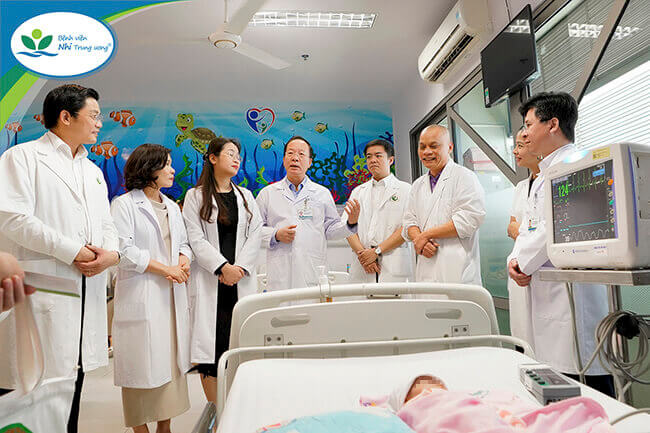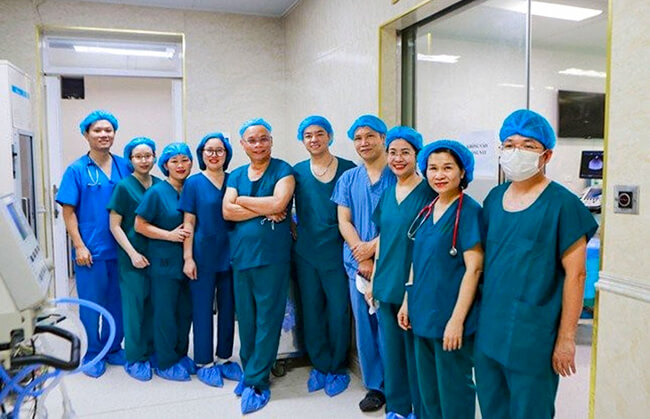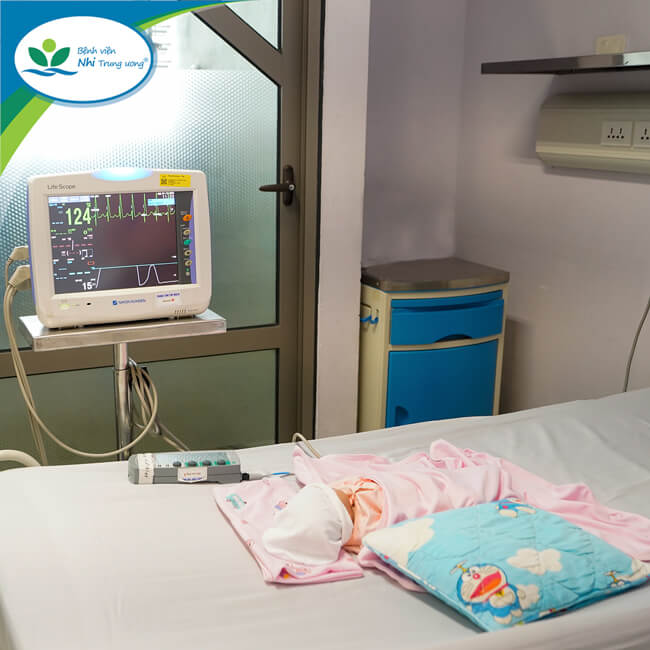“On the morning of November 7, Prof. Dr. Tran Minh Dien – Director of the Vietnam National Children’s Hospital, and Prof. Dr. Nguyen Duy Anh – Director of Hanoi Obstetrics and Gynecology Hospital, visited and encouraged baby M.A and her family. This is a complex congenital heart disease case – Third-degree atrioventricular block, heart failure, which was successfully treated by the collaborative surgical efforts of the two hospitals, implanting a pacemaker immediately in the delivery room.

Pregnant woman T.L (33 years old, Hanoi), with a 6-year history of lupus erythematosus. During pregnancy, she discovered fetal arrhythmia at 22 weeks. The baby’s heart rate was significantly lower than normal (50-60 beats per minute instead of 120-160 beats per minute). Diagnosed with a severe prognosis for the fetus, slow intrauterine development, enlarged heart, excess pericardial fluid, and third-degree atrioventricular block, she was advised to continue lupus treatment and was admitted for fetal monitoring. Doctors from Hanoi Obstetrics and Gynecology Hospital coordinated with the Vietnam National Children’s Hospital to find the best treatment plan for both the mother and the baby.
At 35 weeks of gestation, fetal heart function rapidly deteriorated, and immediate cesarean section was performed to ensure the baby’s safety. On October 10, two consecutive surgeries were performed at the delivery room – fetal extraction and pacemaker implantation by the medical teams from the two hospitals.
Baby M.A was born weighing 2,150g, with a dangerously low heart rate (around 50 beats per minute, sometimes dropping to 35). Quick medical interventions, including intubation, tests, ultrasound, and pacemaker placement, were crucial. The Vietnam National Children’s Hospital surgical team carefully implanted a temporary pacemaker, stabilizing the baby’s condition. With meticulous preparation and teamwork, the surgery proceeded smoothly. The baby was transferred to the Vietnam National Children’s Hospital for further care, treating organ dysfunction, infection, respiratory support, and circulatory support.

Third-degree atrioventricular block is a severe condition disrupting the transmission of electrical impulses in the heart. For baby M.A, this condition was critical, leading to slow heart rate and risking heart failure, multi-organ failure, and a high risk of death. The timely pacemaker placement immediately after birth was essential to normalize the baby’s heart rate, improving the overall health condition.
Despite the short distance between the two hospitals, a joint consultation determined that immediate postnatal transfer could pose risks to the baby’s circulation and cardiac function due to the slow heart rate and compromised health from intrauterine growth retardation. Therefore, a joint team of cardiologists and anesthesiologists from the Vietnam National Children’s Hospital, led by Dr. Nguyen Ly Thinh Truong, collaborated with doctors from Hanoi Obstetrics and Gynecology Hospital to perform the pacemaker implantation surgery for baby M.A right after birth at Hanoi Obstetrics and Gynecology Hospital.

Currently, with intensive care and treatment, baby M.A’s health has stabilized, and her heart rate has returned to normal with the temporary pacemaker’s assistance. In the future, when conditions permit, she will undergo permanent pacemaker placement.

The collaborative inter-hospital consultations, assessing complex cases, have proven effective in enhancing the quality of treatment for many infants with congenital diseases. The synchronized coordination between the Vietnam National Children’s Hospital and Hanoi Obstetrics and Gynecology Hospital before and after delivery has provided timely and appropriate solutions, increasing the chances of a good, healthy life for many babies.”


